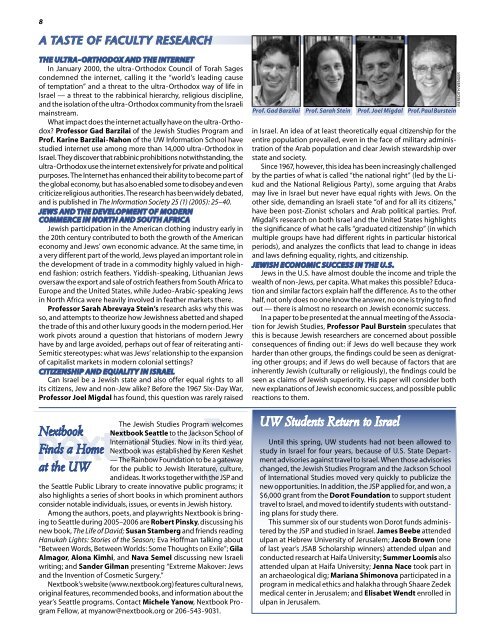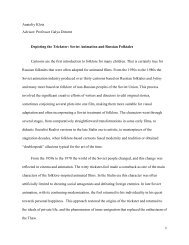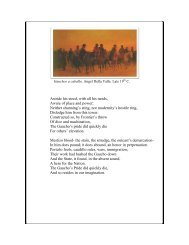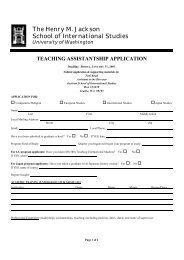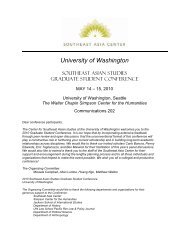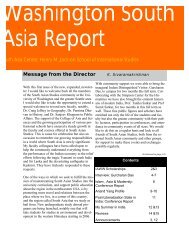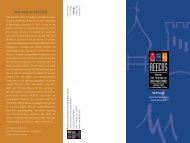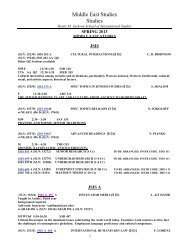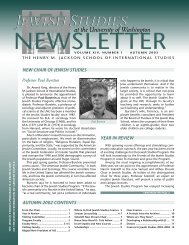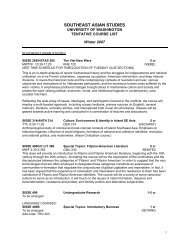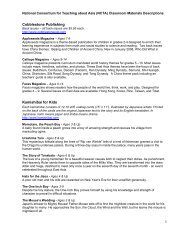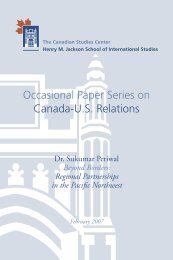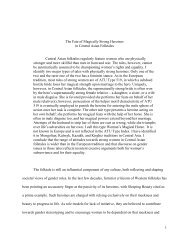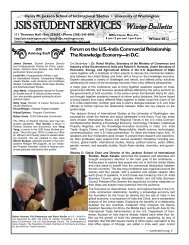js nl 05 9-25 final run! copy - Jackson School of International Studies ...
js nl 05 9-25 final run! copy - Jackson School of International Studies ...
js nl 05 9-25 final run! copy - Jackson School of International Studies ...
Create successful ePaper yourself
Turn your PDF publications into a flip-book with our unique Google optimized e-Paper software.
8<br />
A TASTE OF FACULTY RESEARCH<br />
THE ULTRA-ORTHODOX AND THE INTERNET<br />
In January 2000, the ultra-Orthodox Council <strong>of</strong> Torah Sages<br />
condemned the internet, calling it the “world’s leading cause<br />
<strong>of</strong> temptation” and a threat to the ultra-Orthodox way <strong>of</strong> life in<br />
Israel — a threat to the rabbinical hierarchy, religious discipline,<br />
and the isolation <strong>of</strong> the ultra-Orthodox community from the Israeli<br />
mainstream.<br />
What impact does the internet actually have on the ultra-Orthodox?<br />
Pr<strong>of</strong>essor Gad Barzilai <strong>of</strong> the Jewish <strong>Studies</strong> Program and<br />
Pr<strong>of</strong>. Karine Barzilai-Nahon <strong>of</strong> the UW Information <strong>School</strong> have<br />
studied internet use among more than 14,000 ultra-Orthodox in<br />
Israel. They discover that rabbinic prohibitions notwithstanding, the<br />
ultra-Orthodox use the internet extensively for private and political<br />
purposes. The Internet has enhanced their ability to become part <strong>of</strong><br />
the global economy, but has also enabled some to disobey and even<br />
criticize religious authorities. The research has been widely debated,<br />
and is published in The Information Society <strong>25</strong> (1) (20<strong>05</strong>): <strong>25</strong>–40.<br />
JEWS AND THE DEVELOPMENT OF MODERN<br />
COMMERCE IN NORTH AND SOUTH AFRICA<br />
Jewish participation in the American clothing industry early in<br />
the 20th century contributed to both the growth <strong>of</strong> the American<br />
economy and Jews’ own economic advance. At the same time, in<br />
a very different part <strong>of</strong> the world, Jews played an important role in<br />
the development <strong>of</strong> trade in a commodity highly valued in highend<br />
fashion: ostrich feathers. Yiddish-speaking, Lithuanian Jews<br />
oversaw the export and sale <strong>of</strong> ostrich feathers from South Africa to<br />
Europe and the United States, while Judeo-Arabic-speaking Jews<br />
in North Africa were heavily involved in feather markets there.<br />
Pr<strong>of</strong>essor Sarah Abrevaya Stein’s research asks why this was<br />
so, and attempts to theorize how Jewishness abetted and shaped<br />
the trade <strong>of</strong> this and other luxury goods in the modern period. Her<br />
work pivots around a question that historians <strong>of</strong> modern Jewry<br />
have by and large avoided, perhaps out <strong>of</strong> fear <strong>of</strong> reiterating anti-<br />
Semitic stereotypes: what was Jews’ relationship to the expansion<br />
<strong>of</strong> capitalist markets in modern colonial settings?<br />
CITIZENSHIP AND EQUALITY IN ISRAEL<br />
Can Israel be a Jewish state and also <strong>of</strong>fer equal rights to all<br />
its citizens, Jew and non-Jew alike? Before the 1967 Six-Day War,<br />
Pr<strong>of</strong>essor Joel Migdal has found, this question was rarely raised<br />
Nextbook<br />
Finds a Home<br />
at the UW<br />
The Jewish <strong>Studies</strong> Program welcomes<br />
Nextbook Seattle to the <strong>Jackson</strong> <strong>School</strong> <strong>of</strong><br />
<strong>International</strong> <strong>Studies</strong>. Now in its third year,<br />
Nextbook was established by Keren Keshet<br />
— The Rainbow Foundation to be a gateway<br />
for the public to Jewish literature, culture,<br />
and ideas. It works together with the JSP and<br />
the Seattle Public Library to create innovative public programs; it<br />
also highlights a series <strong>of</strong> short books in which prominent authors<br />
consider notable individuals, issues, or events in Jewish history.<br />
Among the authors, poets, and playwrights Nextbook is bringing<br />
to Seattle during 20<strong>05</strong>–2006 are Robert Pinsky, discussing his<br />
new book, The Life <strong>of</strong> David; Susan Stamberg and friends reading<br />
Hanukah Lights: Stories <strong>of</strong> the Season; Eva H<strong>of</strong>fman talking about<br />
“Between Words, Between Worlds: Some Thoughts on Exile”; Gila<br />
Almagor, Alona Kimhi, and Nava Semel discussing new Israeli<br />
writing; and Sander Gilman presenting “Extreme Makover: Jews<br />
and the Invention <strong>of</strong> Cosmetic Surgery.”<br />
Nextbook’s website (www.nextbook.org) features cultural news,<br />
original features, recommended books, and information about the<br />
year’s Seattle programs. Contact Michele Yanow, Nextbook Program<br />
Fellow, at myanow@nextbook.org or 206-543-9031.<br />
Pr<strong>of</strong>. Gad Barzilai<br />
Pr<strong>of</strong>. Sarah Stein Pr<strong>of</strong>. Joel Migdal Pr<strong>of</strong>. Paul Burstein<br />
in Israel. An idea <strong>of</strong> at least theoretically equal citizenship for the<br />
entire population prevailed, even in the face <strong>of</strong> military administration<br />
<strong>of</strong> the Arab population and clear Jewish stewardship over<br />
state and society.<br />
Since 1967, however, this idea has been increasingly challenged<br />
by the parties <strong>of</strong> what is called “the national right” (led by the Likud<br />
and the National Religious Party), some arguing that Arabs<br />
may live in Israel but never have equal rights with Jews. On the<br />
other side, demanding an Israeli state “<strong>of</strong> and for all its citizens,”<br />
have been post-Zionist scholars and Arab political parties. Pr<strong>of</strong>.<br />
Migdal’s research on both Israel and the United States highlights<br />
the significance <strong>of</strong> what he calls “graduated citizenship” (in which<br />
multiple groups have had different rights in particular historical<br />
periods), and analyzes the conflicts that lead to change in ideas<br />
and laws defining equality, rights, and citizenship.<br />
JEWISH ECONOMIC SUCCESS IN THE U.S.<br />
Jews in the U.S. have almost double the income and triple the<br />
wealth <strong>of</strong> non-Jews, per capita. What makes this possible? Education<br />
and similar factors explain half the difference. As to the other<br />
half, not o<strong>nl</strong>y does no one know the answer, no one is trying to find<br />
out — there is almost no research on Jewish economic success.<br />
In a paper to be presented at the annual meeting <strong>of</strong> the Association<br />
for Jewish <strong>Studies</strong>, Pr<strong>of</strong>essor Paul Burstein speculates that<br />
this is because Jewish researchers are concerned about possible<br />
consequences <strong>of</strong> finding out: if Jews do well because they work<br />
harder than other groups, the findings could be seen as denigrating<br />
other groups; and if Jews do well because <strong>of</strong> factors that are<br />
inherently Jewish (culturally or religiously), the findings could be<br />
seen as claims <strong>of</strong> Jewish superiority. His paper will consider both<br />
new explanations <strong>of</strong> Jewish economic success, and possible public<br />
reactions to them.<br />
UW Students Return to Israel<br />
Until this spring, UW students had not been allowed to<br />
study in Israel for four years, because <strong>of</strong> U.S. State Department<br />
advisories against travel to Israel. When those advisories<br />
changed, the Jewish <strong>Studies</strong> Program and the <strong>Jackson</strong> <strong>School</strong><br />
<strong>of</strong> <strong>International</strong> <strong>Studies</strong> moved very quickly to publicize the<br />
new opportunities. In addition, the JSP applied for, and won, a<br />
$6,000 grant from the Dorot Foundation to support student<br />
travel to Israel, and moved to identify students with outstanding<br />
plans for study there.<br />
This summer six <strong>of</strong> our students won Dorot funds administered<br />
by the JSP and studied in Israel. James Beebe attended<br />
ulpan at Hebrew University <strong>of</strong> Jerusalem; Jacob Brown (one<br />
<strong>of</strong> last year’s JSAB Scholarship winners) attended ulpan and<br />
conducted research at Haifa University; Summer Loomis also<br />
attended ulpan at Haifa University; Jenna Nace took part in<br />
an archaeological dig; Mariana Shimonova participated in a<br />
program in medical ethics and halakha through Shaare Zedek<br />
medical center in Jerusalem; and Elisabet Wendt enrolled in<br />
ulpan in Jerusalem.<br />
MEREDITH WENGER


